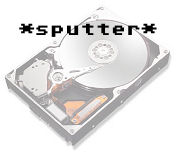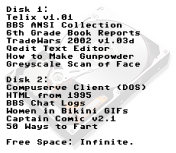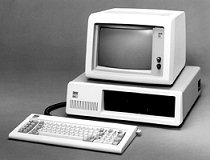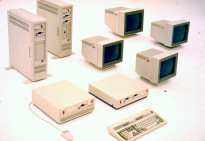The Games Will Grow With Us: Video Game Market Growing Pains…and Pleasures
Thursday, December 29th, 2005 I know this site is called Vintage Computing and Gaming, but what this site is really about is celebrating the history of computers and video games. I’m interested in the history of computers and video games over all time: past, present, and future. What is current now will soon be in the past, and part of history. Those of us who ponder the history of video games can’t help thinking ahead and wondering what will come next. Well, one can’t get a glimpse of the future of an industry without knowing its past. That’s why amateur enthusiast-historians like myself are here.
I know this site is called Vintage Computing and Gaming, but what this site is really about is celebrating the history of computers and video games. I’m interested in the history of computers and video games over all time: past, present, and future. What is current now will soon be in the past, and part of history. Those of us who ponder the history of video games can’t help thinking ahead and wondering what will come next. Well, one can’t get a glimpse of the future of an industry without knowing its past. That’s why amateur enthusiast-historians like myself are here.
It has been said many times that the video game market has grown up with the gamers who purchase and play the games themselves. For example, take “Gamer X,” born in 1975, who played his first video game console, an Atari 2600, at age 3. Then maybe he moved on to a Commodore 64 around age 8, switching later to a NES at age 12, then a SNES at age 16. By the time he hit 1995 and the launch of the PlayStation in the US, that gamer was 20-years-old. That 20-year-old was probably no longer content to play the same video games he did at 3 and 8, although he probably still loved them for nostalgic reasons. No, that person was at a completely different stage in his life with different dreams and a new worldview. As Gamer X grew up, video game complexity and maturity grew up with him, matching him almost perfectly along the way. He had Atari 2600 games with the simplicity for a toddler to pick up and play, NES games with more depth and imagination for adolescents and early teens, then the SNES with its more violent fighting games and deeper and more emotionally rewarding RPGs for mid- to late-teenagers. Then along came Sony. With the launch of the first PlayStation, Sony was the first company to aggressively go after the late-teen and early-adult gamer market. This was a huge surprise to the whole world of “older folks” (i.e. Baby Boomers and above) at the time, because until then, everybody thought video games were strictly for kids. Why did they think they were for kids? Because kids were young, flexible, and open-minded enough to embrace video games when they came into their own.
 At this point, we’re due for a stop off at the present. Even today, in 2005, with the average video game player being 30-years-old (also see this), and — surprise — with Gamer X at 30, video games as an entertainment medium are still being misunderstood by the generations that have come before it. But this behavior is not new; other forms of popular entertainment have experienced similar growing trends…and growing pains. The rock and roll record-smashing of the 1950s and 60s was similar to what’s going on today with social conservatives and alarmist politicians pointing their pens at violent and sexual video games. Remember Elvis? Neither do I — I’m only 24. But I’ve read some books and I know that when he first shook his hips on TV, the whole world of over-40-year-olds thought teenagers everywhere would instantly collapse into social decay, never to recover. It’s been the same story with every generational gap and entertainment medium since the dawn of time. You can look back in the history of TV, music (rap and jazz are good examples in addition to rock & roll), movies, theater, books, paintings, and poetry, and you’ll see the same trend as you do with video games today. It’s the same old story: the older generation in power just doesn’t understand, and frightened governments everywhere, knowing magically what’s best for people under 30, want to make state-parenting de rigueur.
At this point, we’re due for a stop off at the present. Even today, in 2005, with the average video game player being 30-years-old (also see this), and — surprise — with Gamer X at 30, video games as an entertainment medium are still being misunderstood by the generations that have come before it. But this behavior is not new; other forms of popular entertainment have experienced similar growing trends…and growing pains. The rock and roll record-smashing of the 1950s and 60s was similar to what’s going on today with social conservatives and alarmist politicians pointing their pens at violent and sexual video games. Remember Elvis? Neither do I — I’m only 24. But I’ve read some books and I know that when he first shook his hips on TV, the whole world of over-40-year-olds thought teenagers everywhere would instantly collapse into social decay, never to recover. It’s been the same story with every generational gap and entertainment medium since the dawn of time. You can look back in the history of TV, music (rap and jazz are good examples in addition to rock & roll), movies, theater, books, paintings, and poetry, and you’ll see the same trend as you do with video games today. It’s the same old story: the older generation in power just doesn’t understand, and frightened governments everywhere, knowing magically what’s best for people under 30, want to make state-parenting de rigueur.
Well, guess what? Gamer X isn’t going to stop growing, aging, and maturing. By the time people who grew up with video games take positions of authority, the current controversies over games as an entertainment medium will, for the most part, cease (to be replaced by some other concern, no doubt). Rock and roll music, once shunned, misunderstood, and censored by the WWII generation, has grown up with the Baby Boomers until we regularly see 60-year-old rockers like Paul McCartney and the Rolling Stones drawing crowds of thousands.
 Now, back to the present for a moment. At 30, Gamer X is currently enjoying PlayStation 2 games, with ever-growing depth and maturity. But soon (if he doesn’t already), he’ll have his own wife, kids, and family, and his priorities will change again. What happens when Gamer X reaches 40? At 40 years of age, I bet he’ll probably still want to play video games. But will Gamer X be content to run around and shoot hookers, kill virtual people, and steal their cars like he does today in Grand Theft Auto: San Andreas? Or will he want something different? He’ll probably work hard all day and come home exhausted — to a wife to attend to, kids to play with, and bills to pay. Will he have time to play that 100-hour RPG any more? Or does he want something more casual and less involved? Maybe he wants to tend a farm. Maybe he wants to sculpt clouds and float casually through the air. Or maybe he craves more driving simulators for his pending mid-life crisis. And what if he doesn’t have time to master the super-sophisticated, glowing, 20-button control pad that is being peddled to teenagers of the day? Maybe he wants to simply wave his hands in the air (like with the upcoming Nintendo Revolution controller, perhaps), and control things more intuitively. Well, I don’t think Gamer X will have to worry, because I firmly believe that the video game industry will grow with him to meet his changing needs and desires along the way.
Now, back to the present for a moment. At 30, Gamer X is currently enjoying PlayStation 2 games, with ever-growing depth and maturity. But soon (if he doesn’t already), he’ll have his own wife, kids, and family, and his priorities will change again. What happens when Gamer X reaches 40? At 40 years of age, I bet he’ll probably still want to play video games. But will Gamer X be content to run around and shoot hookers, kill virtual people, and steal their cars like he does today in Grand Theft Auto: San Andreas? Or will he want something different? He’ll probably work hard all day and come home exhausted — to a wife to attend to, kids to play with, and bills to pay. Will he have time to play that 100-hour RPG any more? Or does he want something more casual and less involved? Maybe he wants to tend a farm. Maybe he wants to sculpt clouds and float casually through the air. Or maybe he craves more driving simulators for his pending mid-life crisis. And what if he doesn’t have time to master the super-sophisticated, glowing, 20-button control pad that is being peddled to teenagers of the day? Maybe he wants to simply wave his hands in the air (like with the upcoming Nintendo Revolution controller, perhaps), and control things more intuitively. Well, I don’t think Gamer X will have to worry, because I firmly believe that the video game industry will grow with him to meet his changing needs and desires along the way.
 But why stop at 40? Eventually there will be video game systems and content suitable-for and tailored-to a market of 50-, 60-, 70-year-old gamers and beyond (Gardening simulators, anyone? :P). In 2055, when Gamer X is 80, there will be millions of people his age that have grown up with interactive digital entertainment as a way of life. They will want new games to play, and digital entertainment companies, eager for their Social Security dollars (if SS hasn’t collapsed by then), will provide them. This will give the phrase “gaming grandma” a whole new meaning.
But why stop at 40? Eventually there will be video game systems and content suitable-for and tailored-to a market of 50-, 60-, 70-year-old gamers and beyond (Gardening simulators, anyone? :P). In 2055, when Gamer X is 80, there will be millions of people his age that have grown up with interactive digital entertainment as a way of life. They will want new games to play, and digital entertainment companies, eager for their Social Security dollars (if SS hasn’t collapsed by then), will provide them. This will give the phrase “gaming grandma” a whole new meaning.
Finally, our short story of Gamer X’s gaming life ends one day in 2082, when he is 107 years old. There, in a richly decorated room (with Star Wars posters and antique Spawn action figures), he lies on a bed, jerking, moving, and definitely occupied with something. Concerned, his 10-year-old great-grandson enters and poses a simple question:
“What are you playing grandpa?”
“Heaven 2.0, son. Now leave me alone, I’m busy!”
 Computer hard disks weren’t always as reliable as they are now. From 1992 up until about five years ago, it seemed that I had a drive crash on me at least once every two years (Hmm.. they ceased right about the time I stopped buying OEM Western Digital drives from a questionable source). A total drive meltdown was always a terrible event, but it was still no where near as catastrophic as it would be now. You see, back then, the data on my computer was usually just stuff I had downloaded from BBSes or the Internet, maybe some text and Word files, and a few games. But these days, people keep their entire lives on their computers, including home movies, digital family snapshots, personal correspondence (in the form of emails), and gigantic music collections. Not to mention that more original creative work than ever is being done on computers these days — musicians record directly to them, photographers process their pictures on them, illustrators draw and paint with them, and writers write with them. This creative data is unique and irreplaceable — you can’t just download it again if you lose it, making a data backup plan absolutely essential for the modern computer user. Of course, I’m sure most people don’t back up their stuff, and computer users everywhere lose valuable data on a daily basis. Considering the importance of the personal data on PCs these days, I find it absurd that computer manufacturers don’t include some sort of redundant disk protection by default in every PC sold (or at least the build-to-order option). As RAID controllers get more economical thanks to the widespread adoption of the Serial ATA standard, such a scenario will become more realistic. I’m going to go out on a limb and predict that in five years, redundant data protection of some kind will be a standard feature on all consumer PCs. From now on (starting with my last two computers), I’ll never build another computer again without at least RAID level 1 (data mirroring) protection. I also do daily backups to an external hard drive on my three main computers for an extra level of safety.
Computer hard disks weren’t always as reliable as they are now. From 1992 up until about five years ago, it seemed that I had a drive crash on me at least once every two years (Hmm.. they ceased right about the time I stopped buying OEM Western Digital drives from a questionable source). A total drive meltdown was always a terrible event, but it was still no where near as catastrophic as it would be now. You see, back then, the data on my computer was usually just stuff I had downloaded from BBSes or the Internet, maybe some text and Word files, and a few games. But these days, people keep their entire lives on their computers, including home movies, digital family snapshots, personal correspondence (in the form of emails), and gigantic music collections. Not to mention that more original creative work than ever is being done on computers these days — musicians record directly to them, photographers process their pictures on them, illustrators draw and paint with them, and writers write with them. This creative data is unique and irreplaceable — you can’t just download it again if you lose it, making a data backup plan absolutely essential for the modern computer user. Of course, I’m sure most people don’t back up their stuff, and computer users everywhere lose valuable data on a daily basis. Considering the importance of the personal data on PCs these days, I find it absurd that computer manufacturers don’t include some sort of redundant disk protection by default in every PC sold (or at least the build-to-order option). As RAID controllers get more economical thanks to the widespread adoption of the Serial ATA standard, such a scenario will become more realistic. I’m going to go out on a limb and predict that in five years, redundant data protection of some kind will be a standard feature on all consumer PCs. From now on (starting with my last two computers), I’ll never build another computer again without at least RAID level 1 (data mirroring) protection. I also do daily backups to an external hard drive on my three main computers for an extra level of safety. But my backup regimen isn’t really what I want to talk about today. No, it was my complete lack of one that we’ll focus on for the moment. Back when I lost my hard drives, I usually lost most or all the files on them as well. This functioned as sort of a “natural reset” (a
But my backup regimen isn’t really what I want to talk about today. No, it was my complete lack of one that we’ll focus on for the moment. Back when I lost my hard drives, I usually lost most or all the files on them as well. This functioned as sort of a “natural reset” (a  Ah…the trusty Goodwill store. Once the last bastion for countless old computers thrown out by a thankless middle-class America that had grown tired of them, it’s now merely a graveyard for broken VCRs and 1970s-era crockpots (you can always find at least one crockpot at any Goodwill store). So what happened? Around 2001, if I recall correctly, GCF was choking at the gills with hordes of truly worthless PC-clones that no one ever bought. They kept pouring in, non-stop, stacking up at the back of every store. The only thing
Ah…the trusty Goodwill store. Once the last bastion for countless old computers thrown out by a thankless middle-class America that had grown tired of them, it’s now merely a graveyard for broken VCRs and 1970s-era crockpots (you can always find at least one crockpot at any Goodwill store). So what happened? Around 2001, if I recall correctly, GCF was choking at the gills with hordes of truly worthless PC-clones that no one ever bought. They kept pouring in, non-stop, stacking up at the back of every store. The only thing  Paperback books cost fifty cents a piece; hard cover books, one dollar. That’s where I found the first edition of “The Media Lab” by Steward Brand (1987), hardcover and in great condition. This is a really cool find — an excellent addition to my computer history library — at a great price. It’s fun to see what was considered futuristic even as recently as 1987. The book has a great picture section in the middle (Grog no like words, Grog like piktures!), which, since I haven’t actually read the book yet, will have to suffice for a source of a description of the book. There are examples of early computer illustration software, rudimentary 3D computer graphics, anti-aliasing for digital text, force-feedback joysticks, holograms, AI, and something called NewsPeek, which was an idea for an electronic newspaper with eerie echos of the World Wide Web before such a thing existed. If it deals with computers and media, the MIT lab did it all first. And, if I may add personally, they also repeatedly failed to capitalize on their discoveries first, a ridiculous flaw of many a government and corporate think-tank and R&D division over the years (Xerox PARC comes to mind). “But RedWolf,” you say, “That’s not the purpose of a research institution!” I don’t care. Many incredible inventions are made at university labs, but it always takes a maverick separatist entrepreneur to break off from the organization and bring the benefits of those inventions to the masses. Otherwise, great ideas would stagnate there forever, and die on the vine where they were grown. Until new technologies are actively pushed and available in the marketplace, they’re just academic play-toys that don’t help anybody, hoarded by elitist engineers. So am I criticizing academic and big organization research? Hell yes. But hey, that opens up another can of worms, and I think it’s time to eat lunch.
Paperback books cost fifty cents a piece; hard cover books, one dollar. That’s where I found the first edition of “The Media Lab” by Steward Brand (1987), hardcover and in great condition. This is a really cool find — an excellent addition to my computer history library — at a great price. It’s fun to see what was considered futuristic even as recently as 1987. The book has a great picture section in the middle (Grog no like words, Grog like piktures!), which, since I haven’t actually read the book yet, will have to suffice for a source of a description of the book. There are examples of early computer illustration software, rudimentary 3D computer graphics, anti-aliasing for digital text, force-feedback joysticks, holograms, AI, and something called NewsPeek, which was an idea for an electronic newspaper with eerie echos of the World Wide Web before such a thing existed. If it deals with computers and media, the MIT lab did it all first. And, if I may add personally, they also repeatedly failed to capitalize on their discoveries first, a ridiculous flaw of many a government and corporate think-tank and R&D division over the years (Xerox PARC comes to mind). “But RedWolf,” you say, “That’s not the purpose of a research institution!” I don’t care. Many incredible inventions are made at university labs, but it always takes a maverick separatist entrepreneur to break off from the organization and bring the benefits of those inventions to the masses. Otherwise, great ideas would stagnate there forever, and die on the vine where they were grown. Until new technologies are actively pushed and available in the marketplace, they’re just academic play-toys that don’t help anybody, hoarded by elitist engineers. So am I criticizing academic and big organization research? Hell yes. But hey, that opens up another can of worms, and I think it’s time to eat lunch. I’m convinced that computers make the worst monetary investment of a physical item in history, continually going obsolete and losing 95% of their value in just a few years. As a result, I’ve spent most of my money on things that are now near-worthless. This sort of situation is probably unique in the history of mankind if you think about it. If I want some quick cash, I can’t just sell my computer that I paid $2000 for a year ago to get $2000, or even $1000. Not only since it’s used, but since it’s yesterday’s news that it is now worth bupkis. Contrast this to buying a used car for $2000. Take good care of it, and it’s probably still worth about $2000. Or real estate, which only seems to rise in value over time (unless the neighborhood goes to hell). Or, heck — even a table. You can buy one for $20 at a yard sale. It works. You use it. You can sell it for $20 if it still does its function. Nobody has come out with a “Super Table 2000” that has completely obsoleted your make and model of table. No — we who love computers pour our hard-earned dollars into elaborate gadgets that lose all their physical value in no time. I bought an iPod in 2003 that cost $400, now I’d be hard-pressed to get $50 for it on Ebay. And all these Palm and Windows CE PDA palmtop whatevers.. they’re all $500 to $1000 one year, and the next you can’t sell them for more than $100 (Thus making them, along with other dedicated gadgets like cell phones and iPods, even worse “investments” than computers).
I’m convinced that computers make the worst monetary investment of a physical item in history, continually going obsolete and losing 95% of their value in just a few years. As a result, I’ve spent most of my money on things that are now near-worthless. This sort of situation is probably unique in the history of mankind if you think about it. If I want some quick cash, I can’t just sell my computer that I paid $2000 for a year ago to get $2000, or even $1000. Not only since it’s used, but since it’s yesterday’s news that it is now worth bupkis. Contrast this to buying a used car for $2000. Take good care of it, and it’s probably still worth about $2000. Or real estate, which only seems to rise in value over time (unless the neighborhood goes to hell). Or, heck — even a table. You can buy one for $20 at a yard sale. It works. You use it. You can sell it for $20 if it still does its function. Nobody has come out with a “Super Table 2000” that has completely obsoleted your make and model of table. No — we who love computers pour our hard-earned dollars into elaborate gadgets that lose all their physical value in no time. I bought an iPod in 2003 that cost $400, now I’d be hard-pressed to get $50 for it on Ebay. And all these Palm and Windows CE PDA palmtop whatevers.. they’re all $500 to $1000 one year, and the next you can’t sell them for more than $100 (Thus making them, along with other dedicated gadgets like cell phones and iPods, even worse “investments” than computers). So here I am, years later, after spending thousands upon thousands on miscellaneous computers and electronic do-hickeys. I need to drum up some cash. The first thing a traditionalist would say is, “Why not sell what you’ve bought and make some money?” Well, I look around. Gee, don’t I have anything worth anything? What the hell happened to that ten grand I spent over the last five years? I can’t see it anywhere. I look all over the house.. it’s just not there anymore. It has vanished like money poured into a deep, deep hole. Computers are a great way to destroy value. It’s not like what my dad could do with his camera collection, circa 1970-1990. If he wanted a new camera for his collection, he’d just sell his old ones (for about as much or more than he paid for them) to make enough money to buy a new one (of course my dad’s camera collection is becoming obsolete thanks to digital cameras and rapidly losing value, but for over 80 years the technology was basically the same). But it’s more trouble than it’s worth to sell any of my old electronic devices. They’re worth more to me to have them and play with them than the $10 I can make by selling them. And that’s why it’s so easy to collect them. Nobody wants them, they’re useless to people now, and they just take up space. And that’s about when they end up taking up my space instead of theirs, for little or no cost to myself. Initial cost, anyway.
So here I am, years later, after spending thousands upon thousands on miscellaneous computers and electronic do-hickeys. I need to drum up some cash. The first thing a traditionalist would say is, “Why not sell what you’ve bought and make some money?” Well, I look around. Gee, don’t I have anything worth anything? What the hell happened to that ten grand I spent over the last five years? I can’t see it anywhere. I look all over the house.. it’s just not there anymore. It has vanished like money poured into a deep, deep hole. Computers are a great way to destroy value. It’s not like what my dad could do with his camera collection, circa 1970-1990. If he wanted a new camera for his collection, he’d just sell his old ones (for about as much or more than he paid for them) to make enough money to buy a new one (of course my dad’s camera collection is becoming obsolete thanks to digital cameras and rapidly losing value, but for over 80 years the technology was basically the same). But it’s more trouble than it’s worth to sell any of my old electronic devices. They’re worth more to me to have them and play with them than the $10 I can make by selling them. And that’s why it’s so easy to collect them. Nobody wants them, they’re useless to people now, and they just take up space. And that’s about when they end up taking up my space instead of theirs, for little or no cost to myself. Initial cost, anyway.



